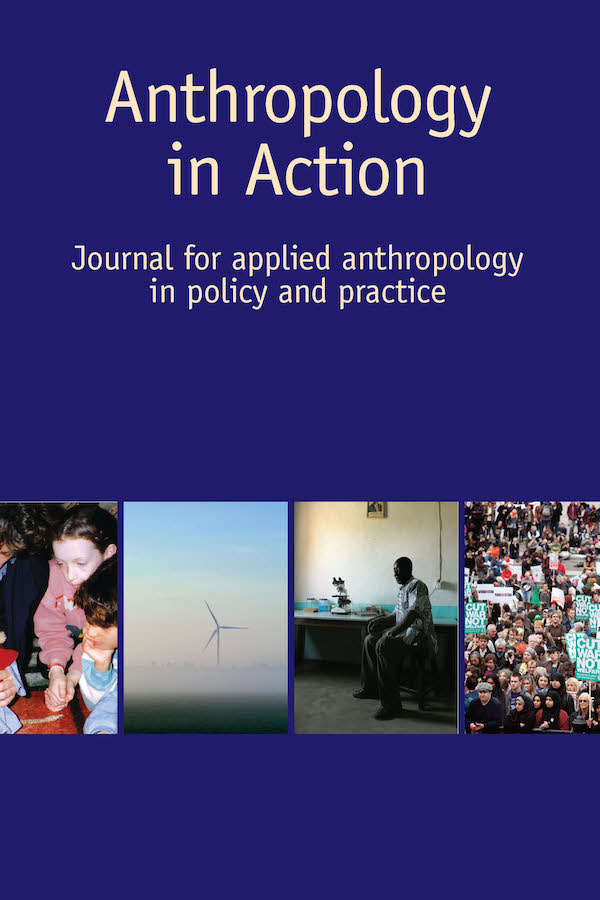
Anthropology in Action
Journal for Applied Anthropology in Policy and Practice
ISSN: 0967-201X (print) • ISSN: 1752-2285 (online) • 3 issues per year
Outgoing Editors:
Andrew Dawson, University of Melbourne, Australia
Simone Dennis, University of Adelaide, Australia
Incoming Editors:
Dr. Pardis Shafafi, French National Centre for Scientific Research, France
Dr. Samira Marty, Binghamton University, US
Subjects: Applied Anthropology
Published in association with the Association of Social Anthropologists’ (ASA) Apply Network
Latest Issue
Volume 31 Issue 1
Introduction to the Special Issue: New Anthropological Perspectives on Children and Youth on the Move
This special issue of Anthropology in Action focuses on the intersection of two equally important, and yet unequally researched, areas of anthropological inquiry: migration and childhood. In recent years, the mediatic attention to migration has led to an increased visibility of children and youth moving through transnational contexts, often with limited access to social and economic resources. Undoubtedly, the transnational movement of young people is far from a recent phenomenon. On the contrary, historically these individuals had more chances to successfully travel long distances in search of a more fulfilled life than their older counterparts. Migration – a movement of people, associated with hopes and prospects for a better life, but also driven by fears of violence and poverty – has always had a young face.
Drawing Ambivalence
Moroccan Youth on the Move and the Experience of Melilla
This article reflects on the significance of Melilla, a Spanish enclave and southern border of the European Union (EU), in the migratory experience of the Moroccan youth on the move to Europe who call themselves
Bilal's Journey, a Story of Emancipation
Age and Labour in the Lived Experiences of Migrant Youths across Europe
Bilal's story traces the journey of migrant youths who abandon European reception projects while remaining undocumented. Based on extensive ethnographic fieldwork and inquiry into Bilal's lived experience, evidence is presented on how the Italian reception system fails to address the migrants’ needs and vulnerabilities. Labour is a central element in the life stories of migrant youths, although access to the labour market is constrained by laws on protection of minors and asylum bureaucracies. This fact collides with the youths’ aspirations, in which mobility and economic independence are seen as fundamental elements of ‘adulthood’. Against this backdrop, steps should be made in both legal and humanitarian approaches to youth migration to promote a regular and dignifying access to labour as a possible form of emancipation and citizenship.
The Cost of Belonging
Stories of Unaccompanied Young Syrian Refugees in Germany
How are family and broader social ties of young people on the move to Europe impacted by their refugee experience? This article reflects on this question through a detailed case study of a Syrian adolescent growing up in Germany. Syrian youth carry the weight of separation from their families, enduring the challenges of a dangerous migratory journey. After reaching Europe, some are obliged to take a leading role in preparing the path for their families to follow. With an ethnographic perspective, this article sheds light on the circumstances they face, and identifies the new forms of relationships they construct with their families and the surrounding society. I stress the variable factors influencing their development and integration in Europe and highlight the challenges stemming from the experience of family separation, engaging in a reflective exploration of the deformed image of family in the aftermath of separation among young refugees in Germany.
Citizenship and Political Identities of Children in Transnational Migration
This article expounds on the relationship between children's rights and asylum discourse as pertaining to the figure of the non-citizen child. Key for the understanding of the political identity of the asylum-seeking child, who is depicted as trapped between paternalistic concepts of childhood and restrictive asylum law on the one hand, and empowering children's rights discourse on the other, is an antagonism in the logic underlying human rights and citizenship discourse. Ethnographic findings with accompanied asylum-seeking children in Germany substantiate the argument, from the perspective of ‘new’ childhood sociology. The concept of citizenship is elucidated as practice lived in the everyday in children's action against exclusionary effects in refugee centres.
Taking their Word(s)
Biographical Violence and Dilemmas of Collecting Narratives from Young People on the Move
Various adults seeking migratory testimonies actively pressure young people ‘on the move’ to Europe, categorised as ‘unaccompanied minors’ (UAMs), to ‘open up’ and share their stories. The suspicion that hangs over their minority and over the credibility of their stories can cause the adolescents to modify their biographies, to conceal, alter or invent elements. How can the researcher bond with them and produce reliable qualitative data without reproducing forms of ‘biographical violence’? Based on a multisited ethnography ‘on the move’ in Morocco, Spain and France, this article invites exploration of young people's shifting biographies throughout their journey to Europe. It supports the idea that the scientific and ethical challenges of collecting the voices of young people can also constitute levers of scientific knowledge.